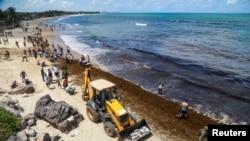Volunteers flocking to the Brazilian shore to clean up the mysterious oil polluting more than 100 northeastern beaches are getting ill from collecting the toxic sludge without the proper equipment, health authorities said Friday.
After oil slicks washed up beaches along more than 2,000 kilometers (1,240 miles) of tropical coastline, hundreds of people turned out to clean the beaches, many using their bare hands and feet for lack of gloves, boots or even masks to block the fumes.
"I had nausea and diarrhea the next day, and a splitting headache," said Vera Lucia Silva, a local government clerk who said she and a friend collected 80 kilograms (176 pounds) of oil with their hands into plastic bags on the Itapuama beach south of Recife.
Silva, who ended up on a drip in the local infirmary, said local authorities provided no equipment and after two days several charity groups appeared and handed out masks and boots.
Origin a mystery
The thick sludge has been washing up for nearly two months, and authorities and experts have been baffled by its origin. It is believed to be Venezuelan crude but there is no evidence of how it entered the open ocean.
A patchwork coalition of volunteers, public employees and armed forces, with varying levels of training and support, have taken to the beaches to save turtles and other wildlife, collecting the gummy oil into bags.
The Pernambuco state health department said Thursday that 19 people had been treated in hospitals for intoxication, either from direct contact with the oil or from the solvents being used to dilute it in the cleanup efforts. Local media reported that hundreds more had reported symptoms but had not sought treatment.
Gerald Graham, a Canadian oil-spill response expert, said the authorities should be keeping people off the beaches if they’re not trained and equipped, because exposure to the oil is very hazardous and could cause injury or even death.
Why the delay?
"The government's response has been really pathetic. They were not there. Why did they take so long to act?" he said in a telephone interview.
Brazil's government has said it followed standard protocols since the start of the environmental disaster. Because the heavy crude does not float on the ocean surface like most oil slicks, officials said, traditional methods of keeping it off the shore have been ineffective.
On Friday, Tourism Minister Marcelo Alvaro Antonio visited Porto de Galinhas, a tourist hot spot in Pernambuco. He dipped his feet in the sea to show that Brazil's beaches were clean and open for business, with less than 10% affected by the oil.





